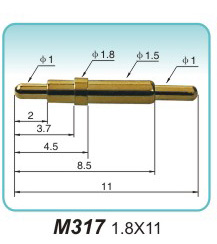Pogo pin is a spring-type probe formed by the three basic components of
needle shaft, spring and needle tube after being riveted and preloaded by
precision instruments. There is a precision spring structure inside.

1. Acrylonitrile/butadiene/styrene copolymer (ABS), this plastic is used as
a substitute for nylon shell, has good mechanical properties, is a
heat-resistant, chemical-resistant, easy-to-process material, and the price is
low It is cheaper than nylon, has creep resistance and heat resistance of 60
degrees.
2. Polyurethane (PUR), spring thimble manufacturers feel that the material
is easy to bend and fatigue resistance, has excellent tear strength and good
chemical resistance and solvent resistance. It is suitable for use in
ultra-small connectors and DIP rotary switches. The heat is 85 degrees.
3. Polypropylene (PP), this material has the characteristics of light
weight, affordable price and good wear resistance. It is suitable for use in
small and ultra-small coaxial connectors with a heat resistance of 90
degrees.
4. Polyphenylene ether (PPO), this material has excellent engineering
properties, good mechanical and electrical properties, creep resistance, and
heat resistance of 105 degrees. But the disadvantage is poor solvent
resistance.
5. Polyaluminum (PSO) is a shell material used in jack sockets. It has good
electrical properties and chemical resistance, extremely high
temperature-resistant plastics, good engineering performance, and affordable,
with a heat resistance of 150 degrees.
6. Polyvinyl chloride (PVC), AMP uses this material as cables, sheaths, and
heat shrinkable tubes. It has good physical properties, durability, low moisture
absorption, and extrusion molding characteristics, but it is not suitable for
use in shells, and its heat resistance is 60 degrees.
7. Polytetrafluoroethylene (PTFE), this material has excellent temperature
resistance, good chemical resistance and solvent resistance, durability,
excellent insulation, strong non-hygroscopicity, relatively expensive, radiation
resistance, and heat resistance of 250 degree.
8. Polyethylene (PE) has excellent chemical resistance, strong insulation,
and relatively low price. AMP is often used as a low-density material with a
heat resistance of 80 degrees.
Read recommendations:
M1306 4.50x5.50(12A)battery electrode manufacturer
M1567 3.0x20(1A)
M749 1.45X8
Notes on selection of spring thimble
How does spring thimble plating ensure its composition and quality